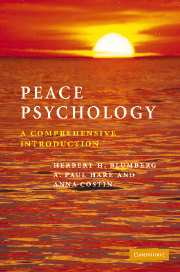Book contents
- Frontmatter
- Contents
- Preface
- Acknowledgements
- The scope, structure and content of this book
- Part I Introduction
- Part II Interdisciplinary practice
- 2 Government policy and international relations
- 3 Education
- 4 The feminist approach
- 5 Philosophy, ethics and religion
- Part III Primary psychological topics
- Part IV Core topics in peace and environmental studies
- Part V Terrorism
- References
- Index
5 - Philosophy, ethics and religion
Published online by Cambridge University Press: 05 June 2012
- Frontmatter
- Contents
- Preface
- Acknowledgements
- The scope, structure and content of this book
- Part I Introduction
- Part II Interdisciplinary practice
- 2 Government policy and international relations
- 3 Education
- 4 The feminist approach
- 5 Philosophy, ethics and religion
- Part III Primary psychological topics
- Part IV Core topics in peace and environmental studies
- Part V Terrorism
- References
- Index
Summary
Peace psychology has links with a surprisingly wide array of disciplines, partly because information and the setting of peace-related priorities in any discipline are typically mediated by perception and other psychological processes. This is true for some of the scientific aspects of armaments and more obviously so for, say, the philosophical meaning of peace among both principal policy-making ‘actors’ and the general public. Within the arts, these links pertain – among other disciplinary perspectives – to philosophical, ethical, religious and historical matters and are concerned with topics such as historical interpretations, principled nonviolence and threats to professional neutrality.
In principle, a research literature within peace psychology could also analyse the salutary effects of drama, music and other artistic endeavours. With some exceptions, however (e.g. Bruck, 1993; Hendershot, 1999; Hunt and Benford, 1994; Kapitan, 1997; Warner, 2001; Yawney, 1995), references to these in the recent behavioural sciences literature have been mainly incidental, so we can do little more here than note the importance, in principle, of such approaches, with regard to addressing indirect (institutionalized) as well as direct conflict.
Some of the material on the interface between psychology and disciplines within the arts is dealt with in part IV. The present chapter is mainly concerned with some philosophical, ethical and religious matters.
Quasi-philosophical considerations
S. M. Mitchell, Gates and Hegre (1999), basing their mathematical paradigm partly on precepts of Immanuel Kant, have confirmed that war tends to be followed by democratization, which in turn acts to diminish the likelihood of subsequent wars.
- Type
- Chapter
- Information
- Peace PsychologyA Comprehensive Introduction, pp. 46 - 52Publisher: Cambridge University PressPrint publication year: 2006

